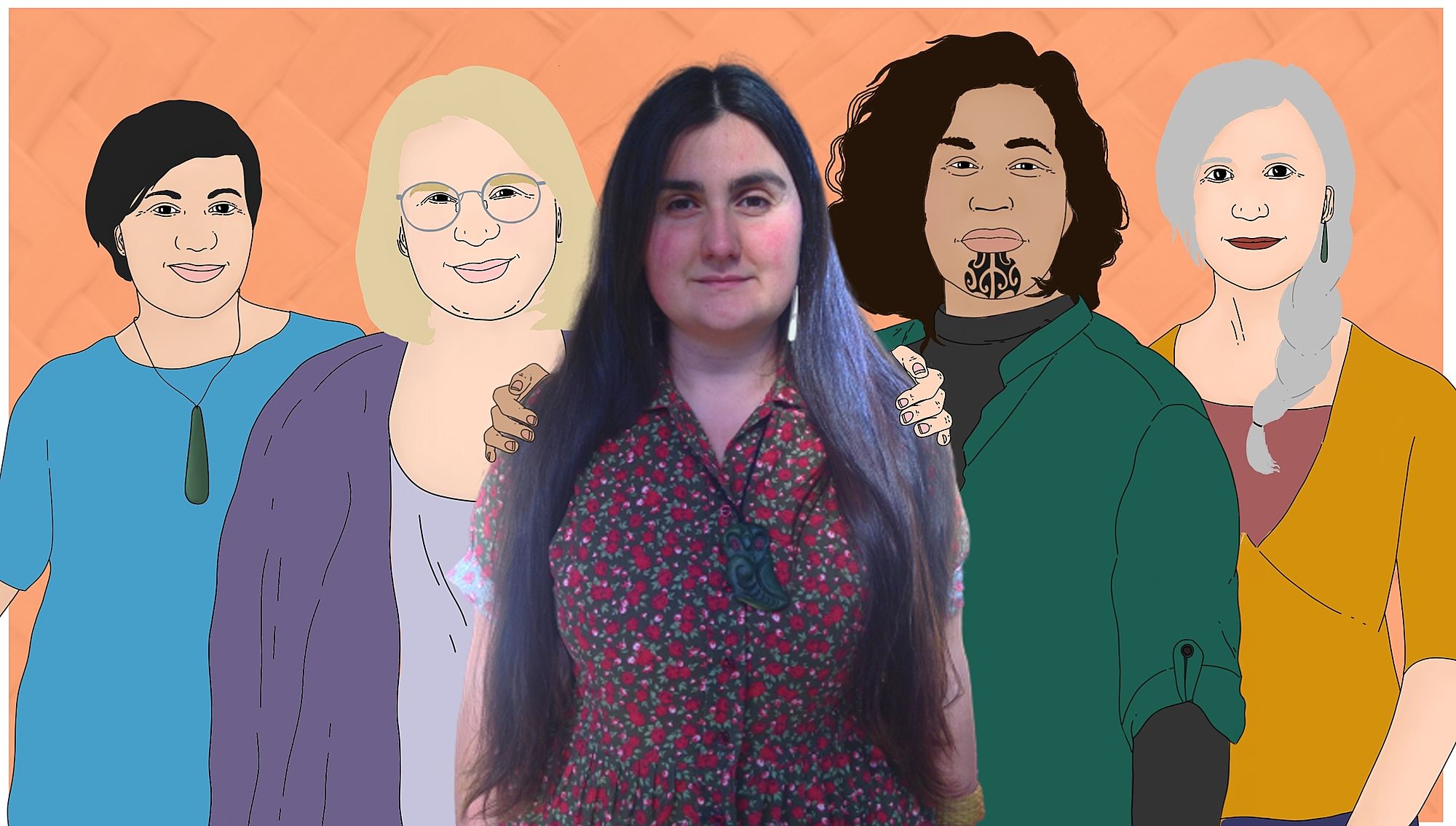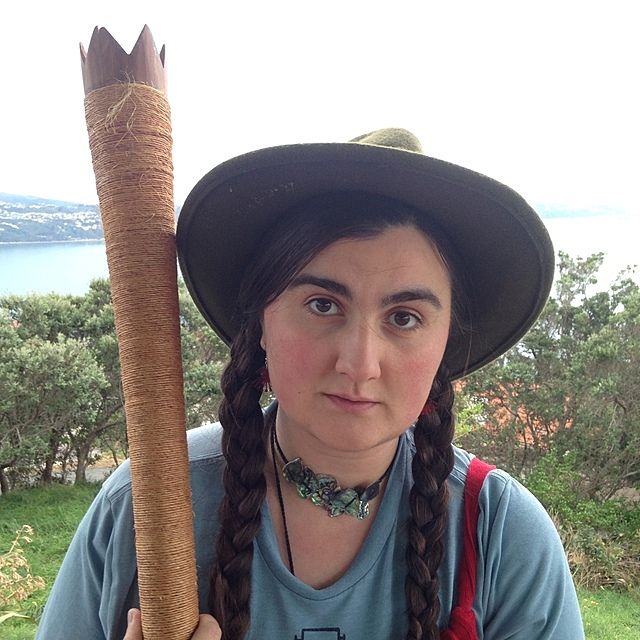An Ode to the Aunties
Ruby Solly interweaves ancient narrative and contemporary tales in this love letter to the aunties.
In one of our Kāi Tahu pūrākau from Teone Taare Tikao, recorded in the book Tikao Talks: Traditions and Tales, we learn of Hinepunui-o-toka, the mother of the southern winds, and her husband Mahuika. Hinepunui-o-toka, Mahuika and their daughters live on a sandbank around the edge of the world. When Māui's mother gives birth to Māui too early and believes he has died, she casts him aside. This is when her sisters, the aunties, swoop in to feed and nourish Māui back to life. They raise him into not just a man but a demi-god, who becomes one of the forefathers of millions of Pacific people, including those of us in Kāi Tahu. If it hadn’t been for those aunties, I would not have been woven the way I am.
There is a sandbank somewhere at the end of the Earth where the ocean stops and welkin stops and the winds of the world come to rest. They are chancy beings, like their cousins the Fates, and prone to sudden inhuman boisterousness – which stands to reason; they have never claimed to be human. Indeed, they affect to despise us and almost anything to do with us. Someone got under their guard though, once. They became aunties.
– Keri Hulme, Te Kaihau – The Windeater
Everything has a whakapapa, and the better you know yours, the better you can connect with every person, every place and every thing on the earth. Different iwi and hapū have their own lens on whakapapa; different birth orders, relationships and names. These overlaps and similarities intertwine to create us as Māori. When I look into my Kāi Tahu whakapapa, I can see that without aunties I wouldn’t be alive today – in more ways and generations than one. In this world, we walk backwards into the future.
The way we know our whakapapa and weave it together to connect with people is whakawhānaungatanga; to make a family connection and kinship. Pākehā often say to me, “You have a huge family! You’re always hanging out with your aunties and cousins, how many cousins do you have?” They look confused when I say I only have two first cousins. Then when I explain the relationships I have with others I call cousins and aunties, they can be quick to discount these people as family. But when you can sit with someone, spread your whakapapa out on the table and point to the generation where you were the same person, then they are whānau. When you know 25 to 40 generations, or even further back for some people, four or five just doesn’t seem like a big deal.
I’ll give you answers to questions you didn’t ask and give you questions when you ask for answers
When I went to my marae for the first time, all the women became my aunties. As it does on the marae, I became ‘Rubes’ instead of Ruby. If I don’t tell people off for this, it usually means we’re on cousin or aunty terms. On the marae, be it mine or someone else's, I often get to be an aunty too. I’m the best at piggyback rides, I get out instruments and show the kids how to play, I’ve got a few games on my phone, and I’m happy to be woken up to walk to the scary long-drop with you when it’s cold and dark. Even if it’s winter down south. I’ll be there.
I’ll be there with the knowledge I’ve gained from all of my aunties. I’ll give you answers to questions you didn’t ask and give you questions when you ask for answers. I’m sorry, but this is part of the job of being an aunty. It nourishes the mind and sharpens your eyes, so you can see the whakapapa laid out in front of you. My friend and cousin Michelle puts this better than I ever will.
It used to irritate you when your aunties gave you answers to questions you didn’t ask. But now you do it to every kid that walks your way, you feel it visiting you like a headache. Oi, you need to hear this. Your aunties have that same urgency, their words stabbing holes in the fabric of time, creating alternative currents for you to slip through later. You never know when you’re going to see someone again.
– Michelle Rahurahu, From a work in progress
It’s not just our past that creates whānaungatanga, it’s our future too. There are as many ways to be Māori as there are tangata Māori. But we do often share similar experiences, and many times we’re working towards the same goals. Maybe this is why we aunties pass this information on, why we nurture the way we do. I remember my mother telling me that home was meant to be safe and comfortable because, for me, the world on the outside was hard enough. Back then, I had fewer aunties than I do now. But the aunties I did have were what got me through, when home wasn’t that safe place.
Most of my aunties at this point were Pākehā, which shows me that the aunty phenomenon goes wider than te ao Māori. I think there were things I was missing at the time that would have helped me to thrive, not just survive, but in classic aunty fashion – we do what we can with what we have – those aunties made sure I was always clothed, fed, had a bed for the night, and that I knew I was loved and part of something bigger than myself. I wrote a tribute to them, and how they helped me navigate the world I was trapped in then. I still think this speaks to all the Pākehā aunties I feel lucky to include in those who have influenced me and who I am today.
I have so many mothers, and they show me what I can do.
I have so many brothers, whose hands are always reaching out for food.
– Ruby Solly, “So Many Mothers”
I’ve always had this impulse to fight things that aren’t right. Sometimes it gets me into trouble, which most of the time I can deal with on my own. But sometimes this fight hurts me, and that’s when I need the aunties. My mother would often tell me not to be a martyr, but I’m useless at listening. My father would say that activism and hard work are like being part of a migration of birds flying in a V. The bird at the front cuts the wind currents and moves forward, the face and navigator of the movement. Behind her she has the support of all these other birds, helping her to push against the wind. They all do this for everyone behind them, and when the bird at the front gets tired she simply moves to the back and another bird takes her place. Then she has a rest while continuing to support the new leader.
Recently, I was the bird at the front of the V formation. It was gruelling work, with attacks on my identity and thoughts, gaslighting of my experiences, and threats. But during that time there wasn’t an hour that went by without an aunty checking in. They offered kai, dropped treats off in the mailbox, wove me a putiputi and told me that my feelings and experiences were valid and true. Basically, when you’re at the front of the V, all the aunties are behind you. The aunties have got your back, always.
As you sink your full puku further into the clean couch blankets,
lulling innocently into snooze, you whisper:
"Aunty, your superpower is making people feel loved."
Aunty smiles tears into her eyes.
She thought her love language was kai –
but her love language, iramutu, is you.
– Rangimarie Jolley, ‘Aunty’s Love Language’
Of course, you’re going to make mistakes again and again. Sometimes these mistakes will affect the aunties. But as I’ve found out, they’ll still love you. Several weeks ago I made a mistake with an aunty. She told me, and I cried because I never want to disappoint anybody. I fixed the error the way she suggested, and apologised. Then it was fine. When water runs deep, you can’t afford to let grudges change the flow. In te ao Māori we say pono, tika, aroha. Meaning truth, the way we do things right and love. We follow these steps when we make a mistake, and the aunties forgive us. Because kare, we’ve got bigger things to worry about. I learnt a lot about becoming a better aunty that day. I want to learn to forgive easily and mean it.
I’ve been told before that the unpaid work of women is what holds up the world. According to Statistics NZ, 70% of women’s work in Aotearoa is unpaid. Be that caring for children or the elderly, volunteer work for charity, or the many other things that fit within the sphere of aunties’ work. It’s funny because when I get the opportunity to be an aunty, I never think about it as working for free. I don’t even think about it as working. I think of it as being a part of the whole, as looking after the korowai that is whakapapa and making sure that each stitch is placed as carefully as the one before. That it is nurtured with love so us aunties can be proud and rest easy.
My mother told me that if all the women of the world suddenly stopped working for free, the economy would collapse. In Iceland in the 1970s, all the women decided to stop their free labour for a day. No childcare, no cooking, no cleaning, no working for free. Their actions paralysed the Icelandic economy. Businesses and government offices shut down, and the country sold out of readymade meals within hours.
So my mother was right; but as we’ve learnt recently, there are worse things that can happen than economic collapse. If all the aunties stopped right now, our collective wairua would become soiled, unable to sustain life and nourish us. We wouldn’t connect, we wouldn’t speak the truth, we wouldn’t know how to make things right and then fill the world with more love than the mistake ever caused harm. But lucky for us, the aunties will never stop working, because as Maraea Rakuraku puts it so well:
Aunties are dragon slayers
ready to plunge swords into the hearts of monsters,
Aunties are taniwha crouching in the river
prepared to throw you back to the shore should you stray too far,
Aunties are patupaiarehe
silently watching from afar, certain that you will become exactly who
you are meant to be as has been divined from your parents, your
parents’ parents and your parents’ parents’ parents
Aunties
Aunties are boss.
– Maraea Rakuraku, ‘Aunties are Boss’

